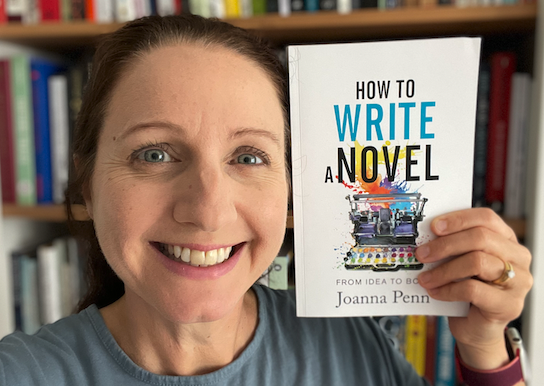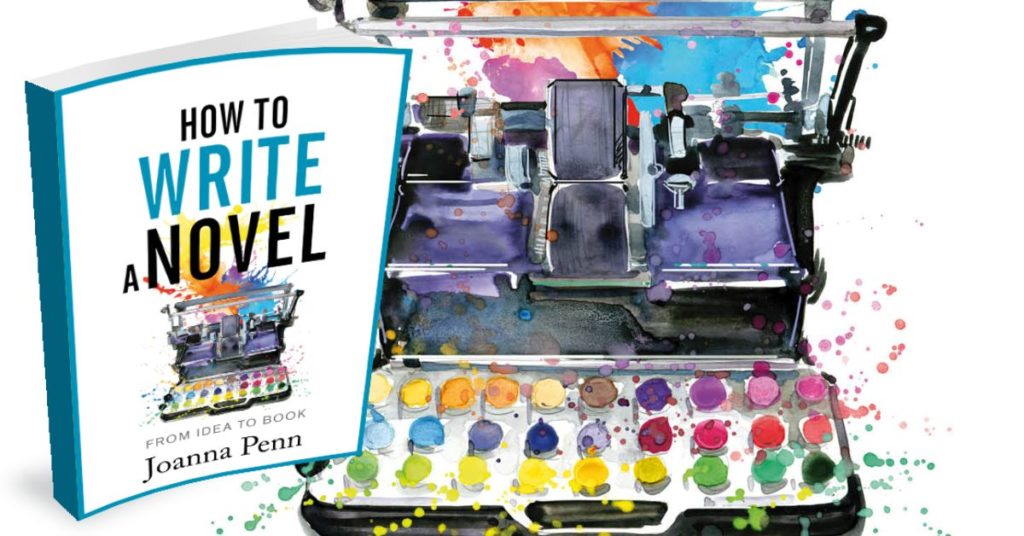How To Write a Novel: From Idea to Book is out now if you buy direct from my store, www.CreativePennBooks.com for ebook, audiobook, paperback, or workbook editions.
It will be out everywhere on your favorite store in your preferred format from 13 August 2022. More details and links here.
In today’s special inbetweenisode, I share the Introduction from the audiobook edition of How to Write a Novel: From Idea to Book, written and narrated by me, Joanna Penn.
Introduction to How to Write a Novel
Writing a novel will change your life.
It might not be in the way that you expect, but when you hold your book in your hand and say, “I made this,” something will shift. The process of getting to that point will light a spark in your creative soul and help you discover unexpected aspects of yourself. It will be one of the things you are most proud of in your life. It will be worth the effort.
My goal with this book is to help you get there.
But How to Write a Novel is not an exhaustive tome of everything you could ever learn about writing. I have deliberately cut it down as much as possible.
The writing craft is like an iceberg.
You can write a novel with the basic knowledge that you can see above the surface. The hidden depths of the writing craft, like the iceberg, go much deeper than you can imagine. Learning it all cannot be achieved in a single lifetime, and that is part of the joy of being a writer. You learn something new with every story you write and every book that emerges into the world.
But you don’t need to know it all in order to get started.
In fact, if you wait until you know everything about the writing craft before you start your novel, you will be overwhelmed with too much information and, most likely, never finish.
This book will help those writing their first novel and also those who want to revisit the creative process. It covers the basic knowledge above the surface of the iceberg and hints at the depths beneath.
What sets this book apart is that I’m an intuitive discovery writer. I don’t plot or outline. Most craft books are written by plotters, outliners, and linear thinkers, so hopefully, I can also provide a different perspective.
You can certainly write and finish a novel with the information in this book, but there’s always more to learn. The writing craft is the journey of a lifetime. Let’s take the first step together.
You can learn how to write a novel
I used to think that authors sat at their desks, and perfect words flowed effortlessly from their fingertips. I thought that the sentences in the pages of a finished book emerged from the author’s mind fully formed. That writers entered a state of flow and wrote without effort. In fact, if it was difficult, and they struggled, perhaps they weren’t a ‘real’ writer after all. Perhaps they didn’t have talent or a gift for writing and, of course, that meant I could never write a novel because I, too, had neither.
But that is not the reality of the writing life.
The words you read in a finished novel result from hard work, occasional moments of flow and flashes of insight, and an editorial process that transforms the first draft into a finished book.
Too many new writers give up because they don’t know the next step to take, or they find that writing a novel is harder than they expect. But it’s worth the effort, I promise you, and this book will help you through the journey.
Who am I?
Like you, I’m a reader and I love books. I read every day — for escape, fun, and solace, as well as for entertainment, education, and inspiration. I spend way too much money on books!
When I was a little girl, I would toddle into my mum’s bedroom at night. Instead of a teddy, I would drag my favorite books in with me and curl up at the end of the bed with them in my arms.
I remember little about what happened at school or even university, but I remember so many of the books I read along the way. The written word has always been my happy place. Perhaps that’s also true for you.
I never thought I could be a fiction writer. Such a rarefied breed of miraculous creatures surely lived in ivory towers somewhere inaccessible to mere mortals. Those who could turn their thoughts into words were so far away from my experience, there was no way I could ever talk to them, let alone become one.
But if writing is the way you express yourself, if writing is the way you figure out the world, if writing is your art and your joy and the thing you do that makes life make sense — then you must write.
Eventually, I discovered this truth and gave myself permission to write more than just my journals.
I started writing nonfiction for publication in 2006 and wrote the first five thousand words of my first novel in 2009.
Since then, I’ve written eighteen novels and novellas, in addition to many short stories, as J.F. Penn, and co-written several others. I’m an award-nominated, New York Times and USA Today bestseller, and I’ve sold nearly a million books in over one hundred countries and multiple languages.
I certainly don’t know everything about the writing craft, but I hope my insights from the author journey will be useful for you.
How to read the book
It’s been a challenge to structure the material in this book because, for me, writing a novel is about wrangling chaos. I’ve never had a linear process — either for learning how to write, or for crafting my own novels.
Some authors are structured and organized, and others are more intuitive. But most writers do not progress from story idea to characters to plot to theme in an organized fashion every time. Most do not write the first line of the first paragraph and then proceed all the way to The End in order.
Creation is not a linear process.
It’s more like a whirlwind — at least it is for me. A tornado of ideas and characters and plot points and deeper themes and images and so much more, all whirling around in no particular order.
My job as an author is to wrangle that chaos. To capture the whirlwind and channel it into a linear story for the reader to experience, while still retaining the kinetic energy of the original spark.
When you’re starting out, the chaos can seem overwhelming, but when you’ve written a few books, you discover the wrangling process is part of the joy of creation.
I have wrangled the material of this book in the same way. You can read in order or jump to a particular section depending on how you prefer to learn.
Part 1 covers mindset issues, helping you better understand why you want to write, what may have stopped you in the past, and the five principles that will help you make progress now.
Part 2 delves into how to generate ideas, conduct research, and find a writing process that works for you—whether you are an outliner or a discovery writer, or something in between.
Part 3 guides you through the major aspects of the craft of writing a novel, from story structure to author voice.
Part 4 will help you start and finish your first draft, including tips on both mindset and writing tools.
Part 5 focuses on the editing process, with advice on self-editing and working with a professional editor.
There are lots of tips and ideas and processes that might help — but please discard those that don’t work for you. Ultimately, there are no rules, only suggestions from authors who have written the path before you.
We all have to find our own way through wrangling the chaos to a finished novel. You will find your own path, but you might take a few wrong turns and go down some blind alleys before you make it to the finish line.
There are questions at the end of every chapter that might help. You might know the answers right away, you might discover them later, or you might never know — and that’s okay, too.
Writing a novel will change your life — so let’s get started.
Available from mid-August on all the usual stores in all the usual formats. Links here.
The post Writing A Novel Will Change Your Life. Audiobook Introduction Of How To Write A Novel. first appeared on The Creative Penn.
Go to Source
Author: Joanna Penn


